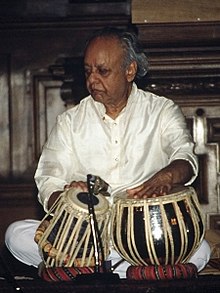Alla Rakha
Alla Rakha Qureshi | |
|---|---|
 Alla Rakha in 1988 (he was right handed unlike shown here) | |
| Background information | |
| Birth name | Alla Rakha Qureshi |
| Born | 29 April 1919 Ghagwal, Jammu and Kashmir, British India |
| Origin | Dogra (Indian) |
| Died | 3 February 2000 (aged 80) Mumbai, Maharashtra, India |
| Genres | Hindustani classical music |
| Instrument | Tabla |
Ustad Allarakha Qureshi (29 April 1919 – 3 February 2000), popularly known as Alla Rakha, was an Indian tabla player specialized in Hindustani Classical music. He was a frequent accompanist of sitar player Ravi Shankar.
Personal life and education
Allah Rakha was born in Ghagwal, Jammu and Kashmir, British India. His mother tongue was Dogri.[1] He became fascinated with the sound and rhythm of the tabla at the age of 12, while staying with his uncle in Gurdaspur. Finding little chances for grooming and appreciation, the determined young lad ran away from home, became a disciple of tabla began studying it with Mian Kader Baksh of the Punjab gharana of tabla players. Sabir Rakha, a brother, also played the tabla.
He studied voice and Raag Vidya under Ashiq Ali Khan of the Patiala gharana. His regimen of practice and dedication were legendary: hours upon hours of hard, disciplined practice, that would later pay off.
He was married to Bavi Begum and their marriage produced three sons, Zakir Hussain, Fazal Qureshi and Taufiq Qureshi; two daughters, Khurshid Aulia née Qureshi and Razia; and nine grandchildren. They all survived him except Razia; it was the news of her death the day before that is thought to have caused his fatal heart attack.[2][1]
Career
Allah Rakha began his career as an accompanist in Lahore and then as an All India Radio staffer in Bombay in 1940, playing the station's first ever tabla solo and elevating the instrument's position in the process. Soon after, he composed music for a couple of Hindi films from 1943–48.

However, he still played as an accompanist, for soloists like Bade Ghulam Ali Khan, Allauddin Khan, Vilayat Khan, Vasant Rai, Ali Akbar Khan, and Ravi Shankar. The venerable master achieved world renown as Shankar's chief accompanist during his apex in the 1960s, delighting audiences in the West with his percussive wizardary, not only as an uncanny accompanist with flawless timing and sensitivity but also as a soloist where he was a master of improvisation, a prolific composer and an electric showman. The partnership was particularly successful, and his legendary and spellbinding performances with Shankar at the Monterey Pop Festival in 1967 and the Woodstock Festival in 1969 served to introduce classical Indian music to general Western audiences.
He became a Ustad (teacher) to Shankha Chatterjee (in 1962), Yogesh Samsi, Prafulla Athalye, Aditya Kalyanpur, Anuradha Pal, Nishikant Barodekar, Uday Ramdas, Shyam Kane, and his sons Taufiq Qureshi and Fazal Qureshi. His eldest son, Zakir Hussain is also an accomplished tabla virtuoso.
Global influence
Rakha popularised the art of tabla, playing across the globe, elevating the status and respect of his instrument. "Abbaji" (as he was affectionately known by his disciples) also bridged the gap between Carnatic music and Hindustani music by playing with both renowned Carnatic musicians and other Hindustani stalwarts.
Leading American percussionists in rock n' roll, such as the Grateful Dead's Mickey Hart, admired him and studied his technique, benefiting greatly even from single meetings. Hart, a published authority on percussion in world music, said: "Allah Rakha is the Einstein, the Picasso; he is the highest form of rhythmic development on this planet." Rakha also collaborated with jazz drummer Buddy Rich on their 1968 album Rich à la Rakha.[3]
Rakha was part of the ensemble accompanying Ravi Shankar during George Harrison's Concert for Bangladesh shows, held in New York City in August 1971. The success of the live album and concert film from this event presented Indian classical music to a wide audience in the West.
Rakha was awarded the Padma Shri in 1977[4] and the Sangeet Natak Akademi Award in 1982.[5] He was also featured in a Google doodle on 29 April 2014 on the occasion of his 95th birthday.
Death
Alla Rakha died on 3 February 2000 at his Simla House residence on Nepean Sea Road following a heart attack, which he suffered on learning of the death of his daughter, Razia, the previous evening.
See also
References
- ^ a b https://www.theguardian.com/news/2000/feb/05/guardianobituaries1
- ^ http://www.encyclopedia.com/doc/1G2-3494700060.html
- ^ BBC Music Review of Rich a la Rakha
- ^ "Padma Awards". Ministry of Communications and Information Technology (India). Archived from the original on 21 May 2009. Retrieved 16 May 2009.
{{cite web}}: Unknown parameter|deadurl=ignored (|url-status=suggested) (help) - ^ "Sangeet Natak Akademi Awards – Hindustani Music – Instrumental". Sangeet Natak Academy. Archived from the original on 19 May 2009. Retrieved 16 May 2009.
{{cite web}}: Unknown parameter|deadurl=ignored (|url-status=suggested) (help)
Sources
- Inlay notes to A Life Story of a Genius compilation CD set (Saregama India Ltd, 2006)
External links
- 1919 births
- 2000 deaths
- Tabla gharanas
- Hindustani instrumentalists
- Indian Muslims
- Recipients of the Padma Shri in arts
- Recipients of the Sangeet Natak Akademi Award
- Tabla players
- Indian drummers
- Musicians from Jammu and Kashmir
- People from Jammu district
- All India Radio people
- Indian male classical musicians
- 20th-century Indian musicians
- 20th-century drummers
